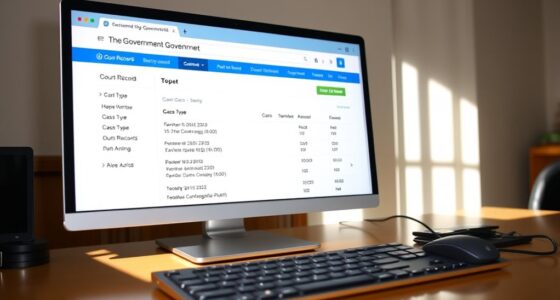To find court records quickly, start by visiting official court websites or trusted online portals that offer digital access. Use search tools with case numbers, party names, or dates for precise results. Remember, some records may be restricted for privacy, so follow guidelines for restricted access. By using trusted sources and understanding restrictions, you can locate any case in minutes. Keep exploring to discover more tips for efficient court record searches.
Key Takeaways
- Use official court websites and trusted online portals for quick, reliable access to case records.
- Search by case number, party name, or date to locate specific records efficiently.
- Utilize filters and AI-powered tools to narrow results and improve search accuracy.
- Be aware of jurisdiction-specific rules regarding public, restricted, or sealed records.
- Always respect privacy and confidentiality boundaries when accessing and handling sensitive case information.

Accessing court records doesn’t have to be complicated. In today’s digital world, finding any case information is often just a few clicks away, making the process quicker and more efficient than ever before. Many jurisdictions now offer online portals that provide digital access to court records, allowing you to search for case details from the comfort of your home or office. This convenience means you don’t have to visit courthouses in person or sift through stacks of paper files. Instead, you can access the information you need instantly, saving you time and effort.
Access court records online easily and quickly from the comfort of your home or office.
However, with the ease of digital access comes important confidentiality concerns. Court records can contain sensitive information, including personal details, financial data, or legal issues that individuals might prefer to keep private. When using online resources, it’s essential to be mindful of privacy and security. Not all court records are publicly accessible, and some may require permission or a valid reason for viewing. Many jurisdictions implement safeguards to protect sensitive data, but it’s up to you to respect these boundaries and use the information responsibly.
To navigate these confidentiality concerns effectively, start by understanding the specific rules of the court jurisdiction you’re interested in. Some records are completely public, while others are restricted or sealed for privacy reasons. When searching online, look for official court websites or trusted third-party databases that adhere to legal standards for confidentiality. These platforms often provide clear instructions on what can be accessed and how to request restricted records if needed.
Moreover, using official sources minimizes the risk of encountering inaccurate or outdated information. Many court websites offer user-friendly search tools where you can input case numbers, party names, or dates to locate records quickly. Some platforms even allow you to filter results by case type or status, further honing your search. Additionally, incorporating AI-powered search tools can enhance the efficiency and accuracy of your inquiries. Remember to keep your searches discreet and avoid sharing sensitive information unless necessary, especially when dealing with confidential cases.
Frequently Asked Questions
Can Court Records Be Accessed for Free?
You might wonder if court records can be accessed for free. In many cases, yes, you can do an online search to find certain records without charge. However, record access varies by jurisdiction and type of case, with some requiring fees or official requests. To save time and money, start with free online searches, but be prepared for possible charges if you need detailed or official records.
Are Juvenile Case Records Available to the Public?
Did you know that juvenile case records are generally protected by confidentiality laws? You might wonder if they’re available to the public. In most cases, juvenile confidentiality is prioritized, so access is limited. However, public access regulations vary by jurisdiction, and some records may be accessible under specific circumstances. Always check local laws to determine if juvenile records are open or restricted in your area.
How Do I Find Federal Court Records?
To find federal court records, you start with court record searches through online court access systems. Visit the PACER (Public Access to Court Electronic Records) website, where you can register and search for case details across federal courts. Many courthouses also offer on-site or remote access to records, but online court access through PACER is the fastest way to locate and view federal case information efficiently.
What Privacy Restrictions Exist on Court Records?
Think of court records as a treasure chest with some guarded secrets. Privacy restrictions, guided by confidentiality laws, act like locks on certain cases, limiting access. Record redaction is like scratching out sensitive details before sharing, protecting individuals’ privacy. You can’t see everything; some info remains sealed or redacted to prevent harm, ensuring court records balance transparency with privacy.
How Long Are Court Records Typically Retained?
You’ll find that court records are typically retained based on specific record retention policies, which vary by jurisdiction. These policies determine how long records are kept before archival procedures handle their storage or disposal. Usually, essential records are preserved for decades, sometimes permanently, especially for significant cases. To locate a record, understanding these retention policies helps you know whether a record is still accessible or has been archived.
Conclusion
Now that you know how simple it is to find court records, imagine the relief of uncovering vital details in minutes instead of hours. It’s like having a personal detective at your fingertips, turning complex legal labyrinths into clear, accessible information. No longer do you have to feel overwhelmed or lost in a sea of paperwork. With just a few clicks, you can confidently navigate the system and find the case details you need—quick, easy, and stress-free.









